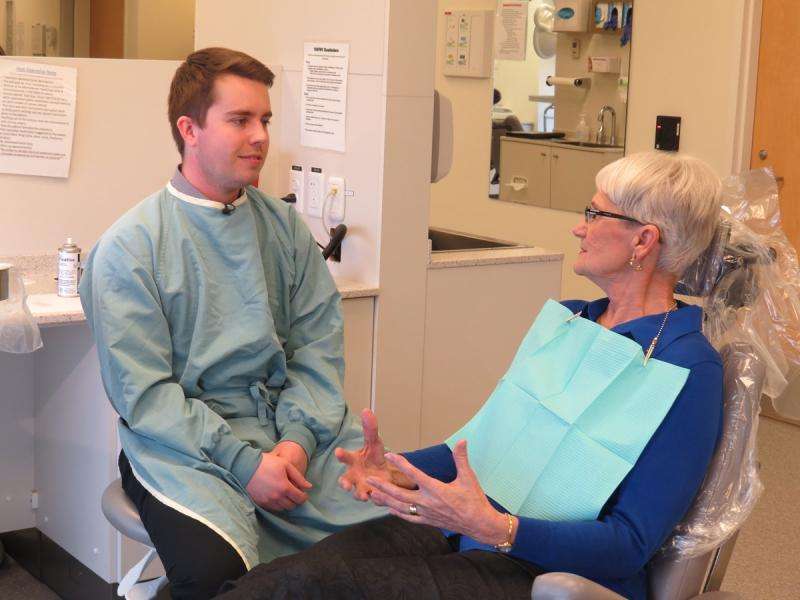Reid Friesen, an Oral Medicine Program resident, speaks with patient Elizabeth LePage.
Can you imagine life with your mouth feeling like it's on fire? The pain is something you can't escape, never mind being able to eat or drink the food and beverages you once enjoyed.
"Sometimes the pain is excruciating," says Elizabeth LePage, who suffers from a condition called burning mouth syndrome (BMS). "To the point where I want to throw up."
BMS is the medical term for ongoing (chronic) or recurrent burning in the mouth without an obvious cause. The discomfort may affect your tongue, gums, lips, inside of your cheeks, roof of your mouth or widespread areas of your whole mouth. BMS appears suddenly and can be severe, as if you scalded your mouth. It can be described as a neuropathic pain where the nerves in the mouth are not functioning properly.
Not much is known about BMS, because it's often underdiagnosed and managing it is complex. Some studies show that 40 per cent of those diagnosed are elderly people—mostly post-menopausal women—and that people with BMS may experience a decrease in quality of life and an increase in psychological distress.
Elizabeth was originally diagnosed with thrush, a medical condition in which a fungus called Candida albicans overgrows in the mouth and throat.
But after she took medication prescribed for thrush, her condition didn't change. A couple more visits to her doctor and denturist resulted in a referral to an oral pathologist: Tim McGaw, from the School of Dentistry at the University of Alberta. McGaw took swabs from Elizabeth's tongue and top of mouth and sent them to the lab. This ruled out any persistent candidiasis and, after excluding other local or systemic causes of secondary burning symptoms of the mouth, a diagnosis of BMS was rendered and a treatment plan was prescribed in November of 2014.
Reid Friesen, an oral medicine program resident in the School of Dentistry, is currently conducting research on a new treatment—one, he hopes, is more effective.
To this day, Elizabeth follows a regimented routine of topical clonazepam, one of the treatments that are sometimes effective. She is also very careful about what she eats and drinks, avoiding things like wine and spicy foods.
Oral health part of overall health
Conditions like this demonstrate that oral health is part of overall health and should not be ignored. If you think something isn't right in your mouth—maybe not your teeth, but the inside of your mouth—go see a dentist, oral pathologist or dental hygienist. They can all be valuable resources in your health care.
More information: If you are interested in the burning mouth syndrome research trial, please contact 780-407-5561 or email rtfriese@ualberta.ca with the subject line Burning Mouth Syndrome Research. Before the trial begins, you will be screened to determine eligibility.
Provided by University of Alberta





















